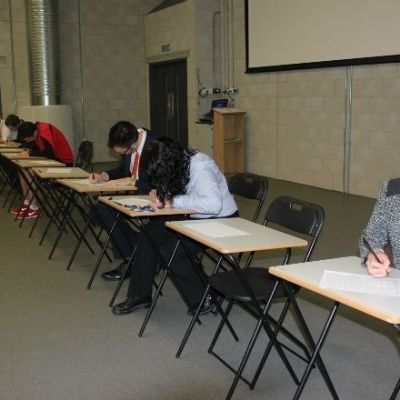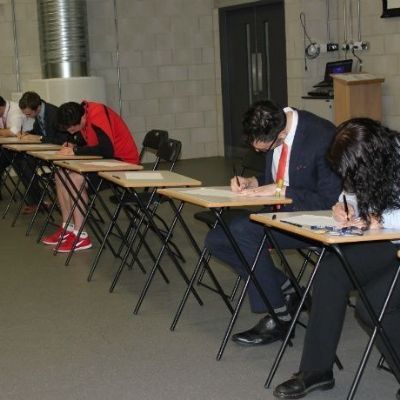Mathematics Department
…high quality mathematics education…provides a foundation for understanding the world, the ability to reason mathematically, an appreciation of the beauty and power of mathematics, and a sense of enjoyment and curiosity about the subject.”
Emma McRae, Making Every Maths Lesson Count
What are we trying to achieve through our curriculum?
At Corby Technical School, we are committed to creating a rich and carefully sequenced mathematics curriculum in which students develop core knowledge, make connections and communicate mathematically. We want students to have an enjoyment of learning mathematics because the more we know, the more we are able to make reasoned decisions, think logically and solve difficult problems with both efficiency and accuracy.
It is our responsibility to raise our pupils’ ambition, aspiration and resilience. The Maths department will cultivate this by:
- Creating a positive working environment that creates success so that all students are motivated and aspirational.
- Developing confident and knowledgeable mathematicians prepared for the demands of other subjects, further study and future careers.
- Developing resilient students and making a commitment that there will be no child left behind.
An ambitious and supportive scheme of work
The mathematics department, consisting of eight teachers, works collaboratively to ensure all students have access to high quality teaching. This is underpinned by a considered and sequenced spiral curriculum, a design in which key concepts are presented frequently throughout the course, but each time with deepening layers of complexity. This is important because mathematics is a hierarchical subject; one that relies on underlying principles as the course progresses. Without the core knowledge, students will struggle to gain greater depth of understanding, problem solve and transfer their learning to other contexts.
The department prioritise and regularly review their approach to teaching and learning. Our lessons are planned to include:
- Explanation & Modelling – Teachers present all new material using a ‘my-turn, your-turn’ approach. Teachers will present clear, precise and mathematical methods and students are then given a similar question to attempt independently.
- Independent Practice – Success in mathematics is dependent on the amount of practice taking place. Students learn challenging content in small incremental steps. After teacher explanations, students will work independently in order to practice this new method/procedure/skill. Retrieving previous information is critical to success in maths. All lessons start with review of previous learning (from last week, last term and even last year).
- Challenge – As students develop confidence with the fundamental core knowledge, we aim to raise the challenge. Students will be given tasks in which they have to apply several topics to solve an unfamiliar problem (interweaving), ‘Same-surface, different depth (SSDD) problems’ that look at questions that seemingly look the same but contain subtleties in the methods and processes needed and goal-free problems.
- Questioning – The department employ a no-hands up questioning strategy. This ensures participation of all students in the lessons and allows teachers to gain greater understanding of students’ progress and confidence. The department use diagnostic questions to gain responses from the whole class at the same time. They use this to have meaningful dialogue in the classroom and to ascertain whether further support or intervention will be needed.
- Feedback – Students complete regular find the gap assessments, which enable both teacher and students to get a snapshot of progress. Teachers mark this work and use it to plan whole class feedback. This is an opportunity to re-teach a particular topic, review misconceptions, developing reasoning or to extend further.
At KS4, students study Edexcel (1MA1) GCSE Mathematics.
At KS5, students study Edexcel 9MA0 Mathematics (Pure Maths).
How can students be supported with their studies?
For exam groups, the maths department run drop-ins and targeted intervention sessions outside of the school day. However, if any child requires any further support, the maths department are around at the beginning and end of the day to help. If you have any concerns about your child’s progress in Maths, please contact your child’s class teacher in the first instance and they will be happy to assist.
At Corby Technical School, we are thankful for the ongoing support of parents and carers. To help your child with Maths at home, please use our schools’ online platform Sparx Maths.
Sparx maths mixes content from recent lessons and practice of previous material. The questions are bespoke to each student, it uses an algorithm to pitch questions to the correct level of difficulty. It also has ‘nudge’ videos, so that students can refresh their knowledge of a topic if they are struggling.
https://www.corbytechnicalschool.org/page/?title=Homework&pid=280
GCSE
The GCSE course starts in year 10. Students sit three papers at the end of the course in year 11. Student can be entered for higher tier (Grades 4-9) or foundation tier (Grades 1-5). The department is fluid yet methodical with setting and tiering choices so that we can be sure students will be able to reach their full potential.

A-Level
Students can opt to study Mathematics at A-Level.

For students who have achieved the highest grades at GCSE, there is the option of studying Further Mathematics. Students study a mixture of pure and applied mathematics. These qualifications are fully assessed at the end of Year 13.
Students that wish to pursue maths but not in the capacity of a full A-Level can enrol on the Core Maths Course. Core Maths provides the opportunity to study Maths that develop explicit links to real-life scenarios and will support students doing other A-Level subject that require highly numerate students. All students will cover:
Paper 1:
- Analysis of data
- Maths for personal finance
- Estimation
Paper 2:
- Critical Analysis of given data and models
- Graphical Methods
- Rates of Change
- Exponential Functions
Both papers are 90 minutes in length, 60 marks and require the use of a scientific or graphical calculator. There will be no optional questions but students will be given both preliminary material and a formulae sheet for the examinations.
Career Links & Future Opportunities
GCSE Mathematics prepares you for the mathematical elements of other post-16 courses:
- Chemistry, Biology & Physics
- Engineering
- Sport Science
- Psychology
- Computer Science
Many A-Level students will want to go and study Mathematics at university. Others will want to study a subject that in which A-level Mathematics is an essential or desirable pre-requisite. This includes popular university courses such as Economics, Accounting and Climate Science.
There are many careers where mathematics is a substantial element of the skills set required:
- Actuary
- Accountant
- Statistician
- Stockbroker
- Engineer
- Meteorologist
- Quantity Surveyor
- Software Tester
- Analyst
- Market Researcher
- Space /Aircraft Industry
- Banking
- Teaching
How do we build students' employability skills?
At CTS we are motivated to make our students the most employable in Corby. We prioritise the development of employability skills in our curriculum and explore new opportunities to prepare them the demands of other subjects, further study and future careers:
- We develop communication and interpersonal skills by setting clear classroom expectations with the use of the task spin board. We model our thought process verbally to students and expect them to ‘talk like a mathematician’. We do not accept vague responses and support students to communicate their ideas mathematically.
- We develop problem solving skills through the emphasis of A03 problems within SSDD and goal-free problems.
- We encourage students to use initiative and to be self-motivated. By ensuring students achieve early success in lessons through engage tasks, students are motivated to succeed. The use of our Sparx Maths platform allows students to take responsibility for their own learning through self-directed work and revision.
- Well-planned lessons that provide pace and ensure there is no time to waste. This trains students to work under pressure. Weekly homework ensure students are used to work to deadlines.
- We develop students’ organisational skills by encouraging them to take pride in their books and notes. Moreover, we reward the method just as much as the correct answer. We place high importance on clear organised mathematical working.
- Our co-curricular clubs develop team-working skills. Our use of think-pair-share in class gives students opportunities to share and refine ideas.
- Our use of thinking hard and goal-free problems help to create resilient students that have an ability to adapt and learn and look at problems from multiple perspectives.
- Numeracy is interlinked to our curriculum, but we now look to find links across the school and ensure consistent methods are used.
- All students are expected to respect everyone’s contributions and ideas. We value difference and diversity – this includes amongst our students but also when celebrating the diversity of mathematical legends.
Negotiation skills are underpinned by one’s ability to analyse, strategize and communicate. Mentioned previously, teacher modelling exemplifies high quality communication, analysis of problems and strategies to solve them. We then expect students to mirror these strategies when presented with new and unfamiliar problems.





